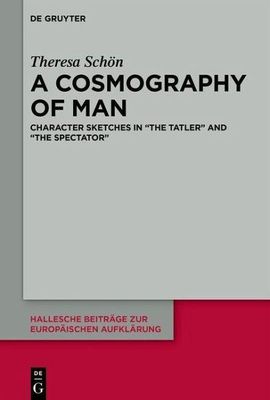University of Halle Series on the European Enlightenment
When the University of Halle-Wittenberg founded the Interdisciplinary Centre for European Enlightenment Studies in 1993, it was following the destiny of its history as a centre of the early Enlightenment in Germany which affected the whole of Europe. Research foci of the Centre are at the moment aesthetics, discourses of history, cultures of learning and erudition, university history and not least the wide field of early Enlightenment as a field of experimentation and the foundation of cultural models for the Modern Age.

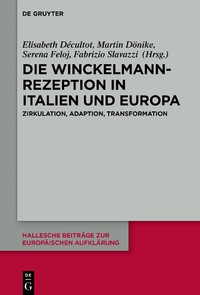
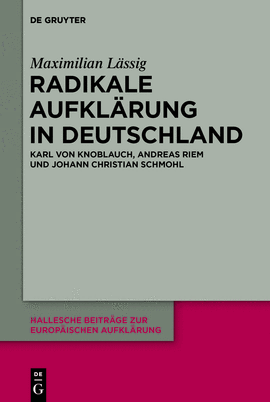
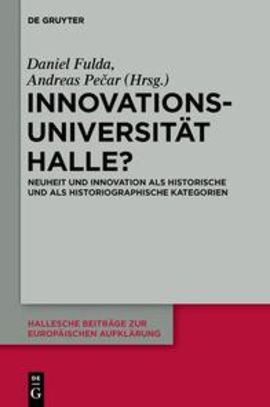
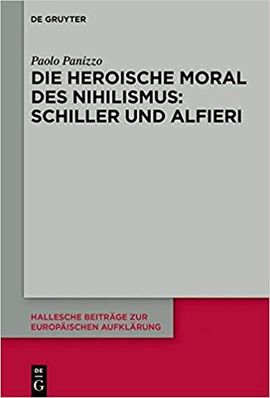

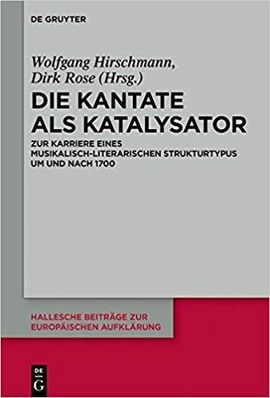
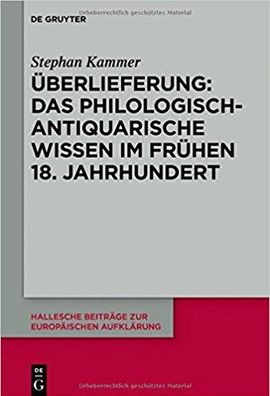
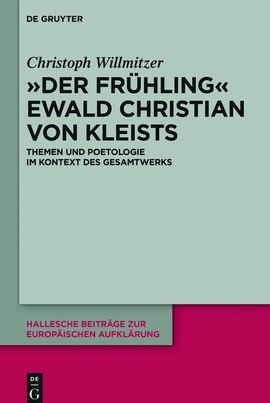
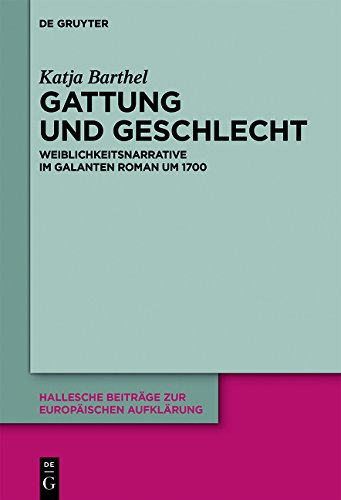


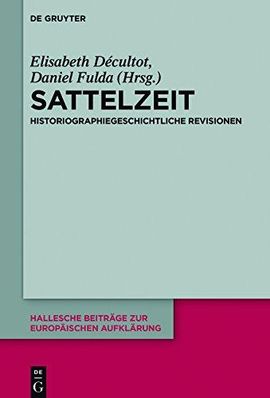
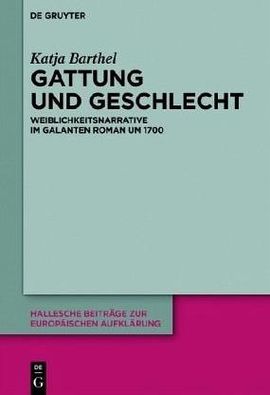
Previously published
Bd. 53
Nina Hahne: Essayistic Writing as a Technology of the Self: Practicing Truth in the Age of Enlightenment
Aims and Scope
The essay became popular in Europe during the 18th century. From early "edifying weeklies" and to the journals published around 1800, the essay served an emergent bourgeois audience as a means of critical reflection. For the first time, this study applies textual analysis to show that essay writers during the Enlightenment conceived of the essay as a technology of the self. It traces the forms of subjectivity developed through essayistic writing.
Link to publisher
Bd. 51
Annette Graczyk: Hieroglyphics in the Eighteenth Century: Between Enlightenment and Esotericism
Aims and Scope
During the 18th century, hieroglyphics posed a challenge to the Enlightenment but at the same time, they were cherished material for esotericism. They were seen as puzzling remnants of a now extinct form of communication, somewhere between pictorial writing, gestural language, and symbolism. Hieroglyphics figured prominently in the theory of language and writing, cultural anthropology, theology, theosophy, as well as physiognomy and art theory.
Link to publisher
Bd. 50
Enlightenment and Esotericism: Ways into Modernity. Ed. by Neugebauer-Wölk, Monika / Geffarth, Renko / Meumann, Markus
Aims and Scope
The more than 30 essays in this volume examine the engagement of the Enlightenment with esoteric traditions of the Early Modern Era and the transformative pathways by which Hermeticism, magic, alchemy, and Kabbalah influenced Spiritualism, Occultism, and Theosophy. The contributors explore intersections between the Enlightenment and Esotericism and identify the concerns and preoccupations that made possible the transition to modern esotericism.
Link to publisher
Bd. 49
Katja Battenfeld: Divine Sensibility: Gentle Melancholy in the English and German Literature of the Enlightenment
Aims and Scope
This work of academic literary research on emotion addresses the cultivation of gentle melancholy during the Enlightenment era to indicate its positive effects alongside the primarily repressive melancholy of the times. The emotionalization strategies in English and German texts reveal a kind of melancholy that facilitated the ability to speak about emotional phenomena and ultimately served to strengthen emotional autonomy.
Link to publisher
Bd. 48
Emotion and Cognition: Transformations in 18th Century European Literature. Ed. by Koroliov, Sonja
Aims and Scope
How is emotion related to knowledge and understanding? How do emotions influence our engagement with knowledge and our orientation to the world? The articles assembled in this volume examine the 18th century as a time of discovery, when original answers to these questions were developed that continue to be innovative to this day. The articles consider various topics, including the impact of emotions on perception, the importance of narrativity in engaging with one's own emotionality and that of others, and how emotions relate to self-mastery and self-therapy while also facilitating the potential for external control and manipulation.
Link to publisher
Bd. 47
Insa Kringler: The Reception of Cambridge Platonism by the European Enlightenment
Bd. 46
Kant's Antithesis? Ed. by Kertscher, Hans-Joachim / Stöckmann, Ernst
Aims and Scope
Johann August Eberhard (1739-1809) was one of the most renowned and controversial proponents of German popular philosophy during the late 18th century. By 1800 at the latest, the triumphal march of Kantian criticism had swept aside this last main proponent of the once popular "Philosophy for the World". The present volume aims to facilitate interdisciplinary access to the Eberhard's work by critically scrutinizing existing research studies, with the ultimate intent of reevaluating the work of this philosopher.
Link to publisher
Bd. 45
Johann Georg Hamann. Religion and Society. Ed. by Beetz, Manfred / Rudolph, Andre
Aims and Scope
To know the nature of a man, noted J. G. Hamann in 1759 in his "Morsels, Crumbs, and Fragments," you must inquire about the conditions of his life. The 24 essays in the present volume reveal Hamann's position at the crossroads of different social constellations. They raise new questions about the Königsberg scholar's ideas regarding the history of society and religion, social theory, economics, philosophy, political science, and religious studies. In this way, they help us to more precisely locate Hamann's place in the key discourses of the Enlightenment.
Link to publisher
Bd. 44
Marianne Schröter: Historicisation as a Means of Enlightenment
Aims and Scope
Ever since the Enlightenment, hermeneutics have been of critical importance as one of the fundamental principles of the arts and humanities. Their incorporation into the field of historical cognition is associated with one name above all: that of Johann Salomo Semler. As well as leading to a methodical reclassification of all aspects of theology, hermeneutics subjected the notion of Christianity itself to a process of historicisation. Marianne Schröter shows that the question of hermeneutics forms the leitmotif in Semler's thinking.
Link to publisher
Bd. 43
Frauke Berndt: Poema. The Epistemic Configuration of Literature around 1750
Aims and Scope
Between 1730 and 1770 the philosopher Alexander Gottlieb Baumgarten and the poet Friedrich Gottlieb Klopstock described in their writings the characteristic features of literary texts using examples of passages which were striking in a pictorial or descriptive, auditory and/or graphical way. Both drew attention to the ability of sensory signs and images with the aid of which man discovers his world. As a result, literature moved from the periphery to the central focus of epistemology and was re-evaluated in its abilities, actions, obligations and intentions.
Link to publisher
Bd. 42
Stefan Borchers: The Generation of the 'Whole Man'
Aims and Scope
Aesthetics was founded as a separate philosophical discipline by scholars at the University of Halle in the second third of the 18th century. At the same time, the question of the "whole man" was a topic of heated debate in Halle: a new science of humanity, i.e. anthropology, had begun to emerge. It is therefore appropriate to speak of the "equiprimordiality" of aesthetics and anthropology, the basis of which is explained in this book.
Link to publisher
Bd. 41
Literature and Theology in the 18th Century. On a Difficult Relationship in the Age of Enlightenment. Ed. by Friedrich, Hans Edwin / Haefs, Wilhelm / Soboth, Christian
Aims and Scope
The relationship between theology and literature in the 18th century is not identical to the relationship between religion and literature or piety and literature, neither conceptually nor factually, neither historically nor systematically. On the whole the relationship can be described as unstable, and in detail as difficult and open. Church-historical differentiations in the religious spectrum of Judaism, Catholicism and‑with historically appropriate internal differentiation‑ Protestantism connect the contributions throughout the literary-historical epochs from the Baroque period to Romanticism with the description and analysis of constellations and relationships of competition and supplementation, of confrontation and coexistence. For example, theology learned from literature how to captivate the congregation as an audience; literature‑ as sermon‑wanted to take over the claim to meaning and orientation from theology.
Link to publisher
Bd. 40
Arnd Beise: History, Politics and the Populace in the Enlightenment Drama of the 16th to 18th Centuries
Aims and Scope
the uprising was a common social form in the life of the lower classes in the Early Modern Age. According to theory, no independent political action was to be expected from the "ignorant rabble", although according to Freud the entire "Western European culture" could be described as a product of "fear of the uprising of the oppressed". However, the dramatists of the period had to react to the "gestures of the folk uprising", because the tragedy was considered "the school of kings". Thus, plays evolved which disregarded political and poetic theory and presented the "people in revolt" in action. This study illustrates how this developed using prominent examples from the 16th to 18th centuries.
Link to publisher
Bd. 39
Ernst Stöckmann: Anthropological Aesthetics. Philosophy, Psychology and Aesthetic Theory of the Emotions in the Discourse of the Enlightenment
Aims and Scope
The study is a contribution to the history of the theory of aesthetic thinking in the 18th century using the concept of emotion as its guide. Using an extended notion of aesthetics, texts are drawn upon from philosophical affect theory, from experiential psychology, anthropology and art theory from Descartes via German popular philosophy, and exemplary readings are used to show the basis for turning to the aesthetic subject, to feeling in the discourse of aesthetics in the late 18th century.
Link to publisher
Bd. 38
Kant and Swedenborg. Approaches to a controversial relationship. Ed. by Stengel, Friedemann
Aims and Scope
Kant as the leading representative of the philosophical enlightenment and the seer Swedenborg, regarded as the father of modern esotericism, would appear at first sight to be two diametrically opposed 18th century figures. At the same time, Swedenborg was one of the few authors to whom Kant dedicated a work of his own- the Dreams of a Spirit-Seer. Since then, controversy has surrounded Swedenborg's significance for Kant's philosophical biography and the history of his works. In the present volume, philosophers, religious scholars, theologians and literary scholars from six countries present their- far from consensual- interpretations of the relationship between Kant's critical philosophy and Swedenborg's "visionary realism".
Link to publisher
Bd. 37
Enlightenment and Esotericism. Reception - Integration - Confrontation. Ed. by Neugebauer-Wölk, Monika
Aims and Scope
The Age of Enlightenment continues the debate with traditional elements from Neo-Platonism and Hermetism, Pythagoreanism, magic, alchemy and Kabbalah which today are subsumed under the heading of early modern age esotericism. The reactions range from the critical or historicising to emphatic acceptance and integration. At the same time, however, the discourse of the age also gives rise to polemic confrontations with the newly emerging esoteric formations. The papers in this volume explore these tense constellations with their progression in the 18th century.
Link to publisher
Bd. 36
Annette Meyer: From Verity to Verisimilitude. The Science of Man in the Scottish and German Enlightenment
Aims and Scope
In the 18th century, the science of man opened up the conceptual framework for re-interpreting the origins and development of the human species itself. It was the ever more popular reports of 'savages' which had led to a questioning of the biblical account of Creation. Borrowing from scientific methods, the Scottish Enlightenment developed a model of hypothesis-led empirical research into humankind. German popular philosophy in particular carried this conception forward in a variety of ways, but their ability to establish connections and their creativity fell into oblivion as a result of the specialisation and disciplining of the field at the beginning of the 19th century.
Link to publisher
Bd. 35
The progenitress of all good schools. Ed. by Garber, Jörn
Aims and Scope
The 18th century was also known as the Pedagogical Century. In 1774, Dessau saw philanthropists founding the first reformed school dedicated to the principles of the Enlightenment. The philanthropists revolutionised teaching by designing a child-centred learning strategy. They no longer wished to impart the learning of scholars but to provide practical vocational knowledge for future citizens. All subsequent movements for educational reform in Germany referred to this first comprehensive experimental school developed by the educationalists of the German Enlightenment.
Link to publisher
Bd. 34
Yvonne Wübben: Ghosts and Scholars. The aesthetic didactic prose of Georg Friedrich Meier (1718-1777)
Aims and Scope
Yvonne Wübben examines a tract on ghosts published in 1747 by the Enlightenment figure and aestheticist G.F. Meier from Halle. She reveals the topical conditions behind its creation, together with its function of bundlingknowledge. The study shows how aesthetics in Halle reacted to an empiricisation of knowledge. Reports of ghosts provide an opportunity to reflect on experience and to make a stand against the 'New Sciences' in the market-place of knowledge. Evidence of the patterns of reception developing here can be traced in literary authors (Goethe, Schiller).
Link to publisher
Bd. 33
Rainer Godel: Prejudice - Anthropology - Literature. The discourse on prejudice as a mode of self-enlightenment in the 18th century
Aims and Scope
This study argues that it would be a foreshortening of Enlightenment discourse to regard prejudice merely as one of the bugbears the Enlightenment set out to dismantle. Rather, the discourse on prejudice served as a mode of self-enlightenment. Anthropologically oriented arguments advanced in literary and popular philosophical reflection on prejudice unsettled the rational certainty with which prejudices were criticized and replaced by the truth. Inquiries into the function of prejudices and attempts to find ways of engaging with them figured as substitutes for philosophical concepts and typologies.
Link to publisher
Bd. 32
Markus Zenker: Therapy in the Literary Text. Johann Georg Zimmermann's "Über die Einsamkeit" in its historical context
Aims and Scope
The Swiss author Johann Georg Zimmermann (1728-1795) is widely regarded as a prototype of the physician-cum-writer. The present monograph stems from the research field of literary anthropology. It begins by investigating Zimmermann's views on human destiny in the contemporary context. Subsequently five sets of issues are addressed as the basis for an analysis of his magum opus Über die Einsamkeit (On Loneliness) (1784/85). In an attempt to situate it in the contemporary landscape, the analysis inquires into the literary features of Zimmermann's oeuvre against the background of the epoch in which it was written. It also sets out to pinpoint links between Zimmermann's works and the history of medicine and science, as well as delineating the author's specific brand of pious Enlightenmentalism.
Link to publisher
Bd. 31
Christian Zwink: Imagination and Representation. Theoretical historiography structures in France in the late 17th and early 18th centuries
Aims and Scope
French historiography between 1670 and 1730 had a dual function to fulfill: generating discursive knowledge and integrating imaging procedures, e.g. in the form of initially disavowed historical imagination. Even before its firm establishment as a discipline in its own right, 'historical vision' was domesticated at the theoretical level by the compromise between pure scholarship and philosophical speculation. At the same time, however, this gave the contribution of imagination to historical epistemology a new value, by virtue both of its greater evidential potential and of its conceptual creativity.
Link to publisher
Bd. 30
Gunhild Berg: Narratives on Human Nature. Moral narratives and behavioural treatises in late German Enlightenment.
Aims and Scope
In terms of the moral strictures of German enlightenment, knowledge of human nature was equivalent to judgment on it. The study demonstrates that moral narratives exemplify the resulting epistemological problem besetting moral philosophy, social ethics, and anthropology: the impossibility of truly knowing the Other. They reflect and engage with the contradiction between morals, morality, and judgment inherent in the philosophy of the Enlightenment. By combining morality and behavioural doctrine with a fictional view of the inner life of the Other they compensate for the lack of human knowledge prevalent at the end of the 18th century.
Link to publisher
Bd. 29
Andre Rudolph: Figures of Resemblance. Johann Georg Hamann's analogous thinking in the 18th century context
Aims and Scope
In contradiction to Foucault's theory of the end of resemblance in the 17th century, and in contrast to the conventional view that analogous thinking had ceased to have any major repercussions when the Enlightenment period set in, this study contemplates various philosophical, poetic, and religious analogy formations of the epoch. An overview of the history of this issue reveals analogy models in existence up to 1750. The second part of the study is devoted to forms and figures of analogy in the works of the Königsberg publicist Johann Georg Hamann (1730-1788), notably in his dialogues with the religious apologetics of the time, and with Socrates, Herder, and Kant.
Link to publisher
Bd. 28
Anacreontic Enlightenment. Ed. by Beetz, Manfred / Kertscher, Hans-Joachim
Aims and Scope
This volume, based on a colloquium at the Gleim House in Halberstadt, assembles articles devoted to the relationship between rococo literature, Anacreontic tendencies, and Empfindsamkeit (the age of Sensibility) in the Old Empire. They concentrate largely on the period between 1740 and 1780, four decades notable for inter-discursive cross-fertilization between art theory, anthropology, and aesthetics. The articles explore the interrelations and/or differences between the ongoing discourses in cultural psychology, the history of mentality, and moral philosophy, situating them in the overall process of 'Enlightenment'.
Link to publisher
Bd. 27
The Calendar as a Manual of Everyday Knowledge. Intercultural links and popular enlightenment in the 18th and 19th centuries. Ed. by Mix, York-Gothart
Aims and Scope
18th and 19th century popular calendars are a singular media-historical testimony of everyday experience with an intercultural dimension. The articles assembled here analyze their evolution, the relationship between text and images, characteristics typical of the genre, gender-specific issues, the cross-cultural relevance of this reading matter, and the role of calendars in the popularization of Enlightenment thinking in Germany, France, Switzerland, and the United States. The volume is a product of two research projects funded by the Volkswagen Foundation and the German Research Council and conducted by the editor of the present volume in conjunction with Hans-Jürgen Lüsebrink and Jean-Yves Mollier.
Link to publisher
Bd. 26
Jürgen Overhoff: Early History of Philanthropism (1715-1771). Conditions, practices, and effects of an educational reform program in the Age of Enlightenment
Aims and Scope
The education program proposed by German philanthropism marks the beginning of modern educational reform. Hitherto unknown is the fact that the sources of this educational theory are to be found in the discourse on the topic in early Hamburg enlightenment as of 1715 and that philanthropist pedagogy was tried out at schools in the state of Denmark in the 1750s. The study describes the early history of philanthropism in detail, concluding that the pedagogic design proposed by Johann Bernhard Basedow and Johann Andreas Cramer was essentially a theologically motivated education in religious tolerance.
Link to publisher
Bd. 25
The Works of Johann Gottfried Schnabel and Early 18th Century Novels and Discourses. Ed. by Dammann, Günter / Sangmeister, Dirk
Aims and Scope
The volume assembles papers (some of them extensively revised) given at a symposium on Johann Gottfried Schnabel (1692-?1760) in Halle in early 2002. They aim at an extension of the purview in which the author of "Die Insel Felsenburg" demands to be assessed. New aspects of his work are pointed up by relating it to Leibniz and Thomasius, hermetic philosophy and spectral theology, and contemporary concepts of culture and anthropology. At the same time, a more comprehensive engagement with the relevant genre profiles in the early Enlightenment casts a revealing light on the standing of Schnabel's novels and on his description of festivity in "Das höchst-erfreute Stolberg".
Link to publisher
Bd. 24
Between Empiricism and Constructivism: Anthropology in the 18th Century. Ed. by Garber, Jörn / Thoma, Heinz
Aims and Scope
Research on the subject to date has largely interpreted the paradigmatic shift in late-Enlightenment anthropology (approx. 1750-1800) as a unified process, and has discussed the various fields of study in isolation. The present volume takes a different course. It insists on the close connection between constructivist and subject-related logic in anthropology, and interprets it in terms of a process of increasing differentiation within the contest between the rival views of man as a physical and moral animal. The various articles discuss the following topics and/or interpretive procedures: the relationship between soma and pneuma; the self-generation of man in the process of natural history; anthropology and the genesis of civilization; empiricism as an anthropological form of epistemology; anthropology and utopia; fictional anthropology as an epistemological approach; philosophy, science, and myth.
Link to publisher
Bd. 23
Tanja van Hoorn: Reading the Body. Georg Forster in the context of 18th century physical anthropology
Aims and Scope
In his famous "Voyage Round the World", and also in his essays "More on the Human Races and Outline for a Future History of Mankind", Georg Forster (1754-1794) took a knowledgeable and committed stand on the central controversies of physical anthropology. In the form of a source-related reconstruction, the present study is the first to point up the allusions and references to the scientific discussion of the day to be found in these texts, and indicates Forster's position in the context of the relevant debates and controversies. Though he did not live to write the >new anthropology< that he was planning, its basic outline thus becomes discernible.
Link to publisher
Bd. 22
The Psychology of Christian Wolff. Systematic and Historical Studies. Ed. by Rudolph, Oliver-Pierre / Goubet, Jean-François
Aims and Scope
Psychology is central to the work of Christian Wolff (1679-1754). Together with natural law, ethics, politics, and economics, it forms the basis of logic and of practical philosophy. The present volume inquires into the complex problems involved in Wolff's concept of a rational and empirical form of psychology on the one hand, and its fundamental function within Wolff's system of philosophy on the other. In addition, it situates the psychology of Wolff in the history of science between Scholasticism and Kant's critical philosophy.
Link to publisher
Bd. 21
Societies, Networks, Communication. New research on societalization processes the century of Enlightenment. Ed. by Zaunstöck, Holger / Meumann, Markus
Aims and Scope
Recently, societies have come in for increasing attention in research on the 18th century. Earlier the emphasis was on the so-called 'Enlightenment societies' but now a broader range of societalization processes have attracted the interest of humanities scholars and cultural studies experts. Common to them all is an interest in the emergence of sociability, networks and communication structures. This is reflected programmatically in the title of the volume. Studies on individual societies and their members join with analyses of personal and institutional networks to form the basis for an emergent picture of the communicative history of societalization in the 18th century.
Link to publisher
Bd. 20
Thomasius and his Literary Field. New approaches to research on his work in a historical context. Ed. by Beetz, Manfred / Jaumann, Herbert
Aims and Scope
The volume goes back to a symposium in Halle in 1998. It essays an examination of the relationship of Christian Thomasius (1655-1733) to the literature and scholarly culture of the period in terms of Pierre Bourdieu's theories on literary and intellectual 'fields'. Taking the concept of field as a more or less explicit heuristic focus on a given subject, the articles inquire into Thomasius' literary and cultural knowledge, his aesthetic and poetological concepts and ideals and the 'economic' aspects of his practical efforts as a scholar, satirist and critic. They also cast light on the impulses he provided for the literary environment. The remaining contributions examine the field structures themselves in which he and the authors he refers to were active, both locally (in Leipzig and Halle) and more widely as a result of the dissemination by print media.
Link to publisher
Bd. 19
Sensitive Physicians. Medical psychology in Halle and the anthropological turn in the early German-speaking Enlightenment movement. Ed. by Zelle, Carsten
Aims and Scope
The volume explores the significance of Halle's 'sensitive physicians' (inspired by the writings of Stahl, Krüger, Unzer, E.A. Nicolai, Bolten, and others) for the 'anthropological turn' that took place around 1750. In so doing it sets out in quest of pre-anthropological anthropology (see Platner and the late-Enlightenment 'philosophical physicians' for an analogy). Of central concern are (1) the roots of anthropology and aesthetics (Baumgarten, Meier, etc.) in the context of Stahlianism, pietism, Thomasianism, Wolffianism, (2) the predating of the origins of anthropology from late to early Enlightenment thinking, (3) the common roots of anthropology and aesthetics in a shared anti-Cartesian bid to supplement traditional logic with a 'logic of sensitive knowledge' (aesthetics) and a holistic image of the human animal encompassing body, mind, and spirit (anthropology). The articles break new ground by examining areas of modernism that have been successfully elbowed aside by Cartesian scientism and have thus been largely neglected in the historiography of science. Awareness of the anti-Cartesian currents in aesthetics and anthropology in and around 1750 also points up clear parallels between the 'sensitive physicians' and important tendencies in present-day thinking on psychosomatics and holistic therapy. It also points the way to a 'logic of the individual'.
Link to publisher
Bd. 18
Erhard Hirsch: The Dessau-Wörlitz Reform Movement in the Age of Enlightenment. Key figures - structures - impact.
Aims and Scope
Erhard Hirsch's study examines the social, political, and artistic preconditions and impacts of a comprehensive modernization process in the central German territory of Anhalt-Dessau in the age of reformer prince Leopold Friedrich Franz. The Wörlitz Garden Kingdom (inscribed in the UNESCO World Heritage List since 2001) and the 'Philanthropin' educational institution founded in 1774 in Dessau are the central concerns of this interdisciplinary study, closely based on contemporary sources. It promises a rich fund of new insights for literary studies, history, art history, and the history of education, society, and economics.
Link to publisher
Bd. 17
Christophe Losfeld: Philanthropism, Liberalism and Revolution. The "Braunschweigisches Journal" and the "Schleswigsches Journal" (1788-1793)
Aims and Scope
This pluridisciplinary analysis of these two journals is a substantial contribution to the study of the reception accorded to the French Revolution in Germany. Whereas their authors initially stalwartly championed the ideals of liberty, the headlong radicalization of the situation in France finally prompted them to take a critical stance toward the Revolution. The authors of the "Braunschweigisches Journal" were inspired to turn their gaze to France by hopes of the initiation of a comparable reform policy in Germany, while the authors of the "Schleswigsches Journal" turned away from France in the course of events.
L'étude du "Braunschweigisches Journal" et "Schleswigsches Journal" (1788--1793) permet d'expliquer avec précision les causes et les limites de la réaction des Allemands face à la tourmente révolutionnaire car ces deux revues paraissant des 1788, il est possible de montrer que la réception de la Révolution est indissociable de la répression qui sévit, en Prusse, sous le règne de Frédéric Guillaume II. Confrontés à la politique réactionnaire de son gouvernement, les Philanthropistes qui déterminent la ligne directrice du "Braunschweigisches Journal", reviennent sur les positions qu'ils avaient formulées jusque-là et insistent sur la nécessité de protéger les droits des individus. Les croyant garantis par la Révolution, les auteurs s'enflamment pour elle. Au fil des mois, ils adoptent donc des positions protolibérales de plus en plus marquées, s'exposant par là à de vives critiques de la part tant des gouvernants que des publicistes conservateurs. L'amertume que les auteurs ressentent vis-à-vis des controverses qui déchirent la République des Lettres est d'autant plus forte que la France trahit, peu à peu, les espoirs qu'ils avaient placés en elle. La dégradation de la situation en France, et la guerre qui s'ensuit, provoquent finalement chez les auteurs du "Schleswigsches Journal" une réaction contraire à celle qu'on pouvait constater chez ceux du "Braunschweigisches Journal" en 1789. Alors qu'à cette date, ils portaient leurs regards vers la France, espérant de leurs souverains une politique de réforme comparable à celle qui s'y produisait, ils les détournent maintenant, croyant pouvoir, par là, sauver les acquis de l'Aufklärung. Néanmoins, même ce mouvement de repli sur soi, qui s'accompagne du refus d'un certain nombre des formes de la sociabilité éclairée et, surtout, d'une prise de parti en faveur de l'absolutisme éclairé s'achève sur un échec.
Link to publisher
Bd. 16
Martin Mulsow: The Three Rings. Tolerance and clandestine scholarship: Mathurin Veyssière La Croze (1661-1739)
Aims and Scope
What does the covert history of the early Enlightenment period look like? Maturin Veyssière La Croze was a Benedictine monk in Paris and later librarian to the Prussian king in Berlin. Tracing his escape routes, networks and intellectual predilections affords an insight into the links between his involvement in the scholarly debates of the day and his personal relations with Jews, atheists and Socinians. The motivating factor for such an inquiry is a French verse adaptation of the Ring Parable in which the tolerance issue is posed in the context of the situation in which exiled Huguenots found themselves after 1685. The quest for the author finally ends among the book producers and réfugiés in Holland around 1720.
Link to publisher
Bd. 15
Axel Rüdiger: Political Science and the Birth of the State. The scholarly approach to government at the University of Halle in the 18th century.
Aims and Scope
In 18th century Germany, the academic establishment of scholarly concern with the phenomena of government and state was closely bound up with the history of the Prussian State University of Halle. Here we find a paradigmatic instance of the way in which the engagement with the idea of state and government itself became an integral factor in the emergence of a particular form of polity. The study is at once a study of early-modern structural change in political science against the backdrop of the history of ideas and an analysis of the university in terms of the sociology of milieu. The transformation in methodological attitudes and the political model of civic order resulting from it show up clearly in the intersection between scholarship and bureaucracy.
Link to publisher
Bd. 14
Language and the Law in German Enlightenment. Ed. by Kronauer, Ulrich / Garber, Jörn
Aims and Scope
In various disciplines, the idea of a 'history of concepts' sparked off innovative research processes after 1945. By contrast, the subject of 'language and the law' harks back to a much older tradition. With reference to the Age of Enlightenment the present volume tests the appositeness of these two approaches by applying them to a number of different issues: problems of terminology in Wolff, Mendelssohn and Kant; the emergence of special languages in Leibniz; legal language and lexicography; the (linguistic) treatment of minorities; legal writing and hermeneutics in the 18th century; enlightened tendencies in legal language; literary transpositions of legal terminologies. The volume sets out to achieve a synthesis between methodological innovation and concrete analysis of source material.
Link to publisher
Bd. 13
Johanna Geyer-Kordesch: Pietism, Medicine and Enlightenment in 18th Century Prussia. The Life and Work of Georg Ernst Stahl.
Aims and Scope
Georg Ernst Stahl (1659-1734) opposed reducing living nature to the inorganic laws of physics or chemistry. His "Theoria Medica Vera" (1708) showed the importance of 'whole person' medicine, in which the unity of all perceptive intelligence, mental, emotional, and physical, are used by the organism to sustain both its moral and material actions. The book traces the life of Stahl and his teaching career at the University of Halle and his influence at the court in Berlin, where he was first physician to King Frederick William I. Special attention is paid to his affiliation with August Hermann Francke and Pietism in Halle, but also to Stahl's popularity in more radical religious circles.
Link to publisher
Bd. 12
Perception - Construction - Text. Images of reality in the work of Georg Forster.
Ed. by Garber, Jörn
Aims and Scope
Unlike the globetrotter and revolutionary Georg Forster (1754-1794), Forster as an author and theoretician of perception and description is altogether less well-known. The volume brings together studies on various categories of Forster's work examined for the light they cast on the question of the acquisition of 'reality' by way of 'experience', 'intelligence', 'ideas', 'images' and 'total impressions' and taking place in the tensions obtaining between perception and the construction of possibility. Concrete text analysis and a determination of the effects intended by the author and the methods he employed as a 'social writer' present Forster in a new light.
Link to publisher
Bd. 11
Peregrination and 'Wanderlust'. Forms of spatial and social experience between Enlightenment and early industrialization. Ed. by Albrecht, Wolfgang / Kertscher, Hans-Joachim
Aims and Scope
The volume assembles papers presented at a conference held at the Centre for Interdisciplinary Research into the European Enlightenment. The aim of the meeting was to close a conspicuous research gap by looking at the status of journeys on foot in 18th and 19th century travel literature in German. The articles examine autobiographical and literary texts giving representative information on the phenomenon of the new social prestige accorded to journeys on foot (and reflection upon them) identifiable in the second half of the 18th century. Central to this reevaluation was an appreciation of the heightened experience of space and distance denied to coach travelers. The volume closes with a source bibliography of works pertaining to journeys on foot in the period in question.
Link to publisher
Bd. 10
From Geometry to Naturalization. 18th century utopian thinking between literary fiction and early modern horticultureEd. by Saage, Richard / Seng, Eva-Maria
Aims and Scope
In the mid 18th century an important reorientation became discernible in Enlightenment discourse. One-sided rationalism was replaced by a conception of the 'whole person' extending its purview to sensual perception and sensibility as an experiential domain of Reason. Against this background, 13 scholars from various disciplines examine what effects this anthropological turn had on utopian literature and the forms of landscape gardening and architecture influenced by it. A remarkable feature of this joint undertaking is that it is the first of its kind to take an interdisciplinary perspective on this paradigmatic change and its implications.
Link to publisher
Bd. 9
Holger Zaunstöck: Society Landscape and Membership Structures. Central German Enlightened Societies in the 18th century
Aims and Scope
The social substratum of Enlightenment in the ancien régime was constituted by the various Enlightenment societies. Learned and Patriotic Societies, Freemason Lodges, Reading Societies, and Secret Societies assembled aristocrats and burghers, scholars and merchants, professors and students with a hitherto unprecedented singleness of purpose. As yet there has been a signal absence of prosopographic studies on this extensive society landscape in terms of the structures displayed by this 'Fraternity of Enlighteners'. In his study the author takes the example of central German societies of this kind and embarks on a systematic analysis of those structures. How many such societies were there in the 18th century, where and when did they exist? Who were the members? Did the societies exist in mutual isolation or were they interconnected via multiple memberships and society 'careers'? Are there indications for a fully-fledged network of 'enlightened' societies?
Link to publisher
Bd. 8
18th Century Scholarship in Germany and Italy. Contacts, translations, institutions. Ed. by Cusatelli, Giorgio / Lieber, Maria / Thoma, Heinz / Tortarolo, Eduardo
Aims and Scope
The volume contains the proceedings of a conference of the German and Italian Societies for Research into the 18th Century. They range from the Latin-based scholarship of the early 18th century to late-Enlightenment engagement with issues posed by the natural sciences and the theory of culture. The first section "Contacts" is comparative in its approach, dealing with such things as correspondence, change of location, change of context, national standpoints in the evaluation of literature, contrastive scholarly ideals, translations. The second section "Institutions" assembles studies on academicism in opera and drama, the institutionalization of scholarship in academies, and the dissemination of scholarly work by the agency of printers and publishers.
Link to publisher
Bd. 7
Skepticism, Providence, Polyhistory. Jakob Friedrich Reimmann (1668-1743). Ed. by Mulsow, Martin / Zedelmaier, Helmut
Aims and Scope
Jakob Friedrich Reimmann stands between Baroque and Enlightenment. He is one of the major representatives of early 18th century historia litteraria, that forgotten discipline which set out to be a history of education, science and the book, and which Reimmann himself applied systematically to a whole range of subjects and cultures. His oeuvre may be seen as typifying the tensions emerging between an inherited faith in providentially ordained history and a new skeptical/hypothetical scientific culture.
Link to publisher
Bd. 4
The Politicization of Utopianism in the 18th Century. From the Dawn of Utopia to the Age of Revolution. Ed. by Neugebauer-Wölk, Monika / Saage, Richard
Aims and Scope
From its beginnings with Thomas More, the classical Utopian tradition laid claim to the status of a regulatory principle or ideal. In the 18th century this changed radically. This volume is designed to trace the way in which the Enlightenment brought the problem of how to actually change existing conditions into the discussion on Utopianism, thus generating forms of legitimization for social praxis anticipating developments in the 19th century. The articles were originally papers held at a symposium on "The Politicization of Utopianism in the 18th Century" organized at the Interdisciplinary Centre for Research into the European Enlightenment in Halle in early 1995.
Link to publisher
Bd. 3
G.A. Bürger und J.W.L. Gleim Ed. by Kertscher, Hans-Joachim
Aims and Scope
The volume assembles papers delivered at a conference in Halberstadt marking the 200th anniversary of Bürger's death and the 275th anniversary of Gleim's birth. They centre around such topics as the friendship between Gleim and Bürger, the concepts of literature and friendship in Gleim's later works, and his correspondence. New light is cast on Bürger's biography, his "Münchhausen", and his teaching at Göttingen University. An annexe contains hitherto unpublished source material on Bürger's social background.
Link to publisher
Bd. 2
Hornig, Gottfried: Johann Salomo Semler - Studies on the Life and Work of an Enlightenment Theologian from Halle.
Aims and Scope
The life and work of Johann Salomo Semler (1725-1791) mirror the problems of Protestant Enlightenment theology in the 18th century and the beginnings of a historical-critical form of theology. After a biographical account, the study concentrates subsequently on Semler's understanding of the Bible, his hermeneutics, his stand on christological and soteriological questions and his approach to the idea of perfectibility. The reasons for his influential decision to distinguish between Christian religion and scholarly theology are analysed.
Link to publisher


